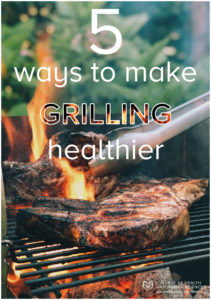Grilling is a delicious and fun way to savor summer meals. Grilling can be a healthy way to prepare food, but there are good reasons to use caution with some less-healthy preparation methods. There are media headlines suggesting that eating grilled food is linked to cancer, but are the claims true or just scare tactics? Read on to learn more about how grilling can be healthy, and the risks to avoid.
5 ways to make grilling healthy!
- Choose lean cuts of beef (eye of round steak and the sirloin tip), pork (tenderloin and rib chops) seafood and chicken (skinless breast).
- Trim off any excess visible fat from meats and remove skin from poultry before grilling.
- Seafood, including shrimp and salmon, do well directly on the grill. Flakier fish (e.g. tilapia, cod, snapper) are best wrapped in foil packets and then grilled.
- Vegetable kebabs are an easy way to get your veggies and grill-time at the same time! Try alternating peppers, zucchini, yellow squash, and onion. Grill marinated portobello caps for an easy veggie burger.
- Fruits, including peaches and pineapple, can be laid directly on clean grill racks and seared quickly for a delicious treat.
- Click here for safe-grilling tips from the Centers for Disease Control and Prevention.
Grilling and health – can char cause cancer?
When meats are grilled at high temperatures (greater than 300°F), two chemicals are formed:
- Polycyclic Aromatic Hydrocarbons (PAHs): Formed when fat and juices from meats drip and cause flames and smoke, which are then deposited on food.
- Heterocyclic Amines (HCAs): Found in meats that are cooked over high heat (especially when charred) due to a chemical reaction between heat and amino acids (protein building blocks).
Is there a reason to be concerned about these chemicals? PAHs and HCAs have been found to be mutagenic in lab experiments, meaning they can cause changes in DNA that may increase cancer risk. In population studies that assess human health (vs. lab studies), however, the research showing the link between HCA and PAH exposure and cancer is less definitive. The research suggests there is reason to be aware of these potentially harmful chemicals, but there is no need to throw out your grill and summer plans.
While there are no current recommendations for how much grilled meat (thus HCAs and PAHs) is safe to eat, current nutrition recommendations advise limiting consumption of red and processed (including smoked) meats in general. Research has shown grilled pork and beef products have the highest concentration of PAHs compared to other grilled meats. Furthermore, the highest concentrations of PAHs have been found in charcoal grilled meats, followed by flame-gas grilled meats, and lowest in oven-grilled dishes. Also, meats with high-fat content are more likely to accumulate PAHs.
Bottom line: Our dietitians believe in the big picture of cancer prevention, grilled meat consumption should be taken into account, but there are much greater risks than grilling that deserve more attention.